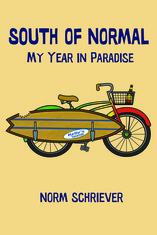 To celebrate the presale release of the book South of Normal, I'm giving away a copy on Twitter and one on Facebook. To enter to win: 1. Leave a comment on this blog. 2.Share the link to www.NormSchriever.com on your Facebook or Twitter. I'll pick the winners from random on Monday, March 4 at noon EST, and you'll have a free autographed copy of South of Normal hot off the presses! | |
|
5 Comments
 An excerpt from the chapter "The Streets are Paved with Honey," from the book South of Normal, due out March 15, 2013. The police station in Tamarindo used to be in town, on the hill toward Lookout Point, but it was donated land so years ago the owner kicked them out. They moved to a one-room station in a private home outside of town, but that led to one small problem—they didn’t have any vehicles. When the police were needed in Tamarindo they had to hitchhike into town. They had guns but no one had money to buy ammunition. As the town grew a real police force was needed to protect the tourists, so between private donations and municipal funding they managed to put enough together to buy the police force its first car. What a proud moment indeed, to have a shiny new vehicle for the police, but there was one glitch: cars need gasoline. The closest gas station was in Bellin, 20 km away, and petrol was over $6.00 a gallon. So the cops started a fuel fund by collecting donations from local restaurants and hotels. When they kicked in enough to buy a tank of gas the police force were mobile, agile, and hostile once again…at least until they got down to “E.” By the time I got there they’d graduated to motorcycles and bulletproof vests. I saw police in town sometimes, when it was sunny out but not too hot and definitely not raining, between the hours of 10:00 a.m. and 2:00 p.m., except during siesta time or on the weekends. They’d park in the shade of the palm trees in the roundabout and hang out. Thank God they were serious about stopping all of the crimes that occurred under those conditions. But they sure put on a good show of it every time you drove by the station, congregating in front for flag raisings at 6:00 a.m. and lowerings at 6:00 p.m. like clockwork. Between all the fundraising and the flag raisings, they appeared to be more of a Girl Scout troop than a police force. You might as well have put them in little brown skirts and unleashed them on the good citizens of Tama with boxes of Thin Mints. They were such a joke that one time the cops actually got robbed at gunpoint by bandidos. Robbing the cops! I’d love to see how that went down: “Hey, you! Freeze!” The policeman says, pulling his gun. “Whoaa cabron! No, you freeze!” The bandido says, pulling his gun, too. “Mae, I’m serious, now! Freeze or I’ll shoot! Don’t you see my gun?!” the policeman says. “Well…I’ve got a gun, too!” the bandido says. “This is your last warning and then I’m going to shoot! Don’t try me!” “Ha! If you were really going to shoot you already would have. You probably don’t even have bullets in your gun.” “Yes I do!” The policeman says. “Then shoot.” (Pause.) “Yes I do!” The policeman says. “Ha! Ok, that’s it. Hand over your gun, now!” The bandido says. The policeman hands his gun over to the bandido with a look on his face like he just drank sour milk. “Now, hands UP!” The policeman puts his hands up. “Wait a second, do you even have bullets in your gun?” The policeman asks. “Of course I do!” “Show me!” the policeman says. “Shut up! Or I’ll shoot!” The bandido says. “Liar! You don’t have bullets, either! I knew it!” “Well…so what? Neither did you!” “Enough of this - hands up!” the policeman says. “Give me your gun or you’re under arrest!” The bandido puts his hands up. “Be careful threatening me, cabron!” the bandido says. “If I had a bullet right now I’d shoot you!” “Well, if I had a bullet right now I’d shoot you in your FACE!” the policeman says. “Yeah? Well I’m going to buy a bullet next week and come looking for you!” the bandido says. “Next week?! Unlikely, puta! Everyone knows you can’t afford a bullet! You can’t even afford the bus to Liberia!” “Liberia? Is that where you buy your bullets? They’re pretty expensive there, no?” the bandido asks. “Yes, it's definitely true. Way too expensive.” “I find they’re usually on sale up in Santa Cruz.” “Santa Cruz? Really? I’ll try that next time, thanks,” the policeman says. “There’s a little frozen yogurt shop I just adore up there, too.” “Wait, you mean Heladeria Ricardo? Ohhh I just love that place!” the bandido says. “I always get the strawb…” “Strawberry!” the policeman says at the same time. “Hahahahaha.” “Hahahahahaha.” (They just stand there and look at each other.) “Sooo…what do we do now?” The bandido asks. “I don’t know.” “Do you think it would be all right if we put our hands down, at least?” “Yeah, that would be okay, I think,” the policeman says. They both put their arms down. “Whewww…my arms were getting tired. So…how about you give me my gun back and just keep yours?” The bandido asks. “Well…” “Come on…it’s hot out here, and it’s almost lunch time. “ “All right, I guess that’s okay,” the policeman says. “Here you go.” “Thanks. Wait…no, that one’s yours.” “Oh, yeah. Here.” “Great, gracias,” the bandido says. “Well…I guess I’ll just go now?” “Yeah, me too.” “I’ll see you next week, amigo.” “You too, hermano. Pura vida,” the policeman says. “And enjoy the strawberry at…” “Ricardos!” they say at the same time. “Hahahahaha.” Tamarindo, Costa Rica, surf, ski, snowboard, diving, pura vida, Central America, Nicaragua, San Juan del Sur, Amazon best seller, travel, adventure, backpack, hiking, sharks, Endless Summer, Robert August, memoir, fitness journey, globetrotting, perfect beach, paradise, spring break, expat, live abroad, work abroad, summer reading, around the world, great read, humor, laugh out loud, South of Normal, Pushups in the P 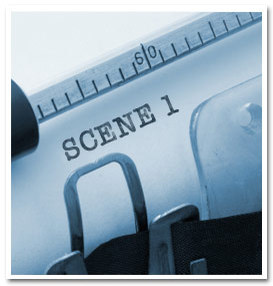 Have you written a book and you're thinking about adapting it to a screenplay? There are a lot of commonalities to telling a good story, but other than that it's a completely different animal. Let me walk you through some movie-making basics that aren't too technical. I’m going to start by giving you the secret to any good movie script: compelling characters. Does that sound vaguely familiar to you authors? Characters: When choosing our HERO (protagonist) we want to fit one of these two molds:
-Whenever I’m writing a story I go through character profiles, pages of pages of a profile of every aspect of the character’s life, including secrets they’ve never told anyone, dreams, ambitions, what scares them. And what they’ve done when faced with moral conundrums. For instance, one question I ask of my characters is: If you found a wallet on the street with $100 in it what would you do? You can never have too much backstory and fleshing to your characters even though you may not use 95% of it in the movie. -Good characters need to be REAL and RELATABLE, not perfect. People will recognize the fears, struggles, and shortcomings in your heroes. They will love that they're struggling forward to be great, not that they are great. Think about Tyler Durden in Fight Club! Here's why: Conflict: Every screenplay follows a simple formula – the main character either: 1) wants something, or 2) has something taken away and then wants it back. From there they go on a quest to get whatever it is they want. But there are many obstacles in the way, including the greatest opponent, the VILLIAN, who has an equal vested interest in them NOT getting what they want. The HERO plods forward to overcome those obstacles and wrestles with the VILLIAN and finally achieves their quest. But they learn something along the way. There has to be an emotional and/or mental change to the HERO along the way, sometimes called the Character Arc. Once we have an amazing, living, breathing character with a clear vision of what he wants, we just roll out the obstacles and the conflicts and watch how he deals with them. For instance, recall the wild, rapid-fire conflicts in The Hangover with the clear quest to get their friend back and get him to his wedding on time. Format: Every screenplay should follow the simple (yet sometimes forgotten) pattern of having a clear 1) beginning, 2) middle, and 3) end. Most stories lag in the middle for several reasons, including that you haven’t set a good foundation of character yet. Beginning: We need to establish immediately, within the first 10 pages or less, who the character is and what it is they want, and what is in their way. We need to know what the stakes are and what critical choices he will have to make. We will start with an incident or scene that will hook readers, throwing them right into the action, and have them asking questions and begging for resolution. It’s okay to start chronologically out of sequence and then fill in parts of the story with flashback or other methods. Middle: Every single line written in a screenplay has to do one of two things: 1) reveal and develop characters, or 2) move the action along. There can be zero fat on the bone in a movie script - If we show a gun over the mantel in the first scene someone better fire it in by the end of the movie! When writing a screenplay remember that your book's exposition or internal monologue won't translate well to the screen. Basically the whole middle plot follows the action lines of the hero chasing what they want and dealing with the villain and all of the obstacles. It’s essential that we build tension throughout, until it’s ready to explode and the movie watchers are begging for a resolution/conclusion. There are several ways to do that. We need to know that the stakes are high. If the main character is just going to lose a lot of money if they are not successful, we might not be as emotionally invested as if the main character’s girlfriend will be killed if he isn’t successful. The stakes need to be very high, and clear to the viewer. In fact sometimes the character doesn’t even realize the stakes, and that keeps us on the edge of our seats! Another great way to build tension is putting the hero’s quest up against a ticking clock. If the bomb is going to explode, the world is going to end, the missiles are going to be fired, the forest ruined, or the girlfriend killed if he doesn’t stop it within 24 hours, there’s a lot more hustle and tension to the plot! Ending: Everyone in the theater knows the movie is going to end soon. The resolution is coming. They’re waiting for that tension to be relieved. We’ll give it to them right on time; HOWEVER there will be a twist. Whatever clues we’ve left threw them off the scent, and the story is concluded and the hero successful in a completely unanticipated way. The twist, or surprise ending, is so important to keep the viewer engaged and guessing throughout the whole third act. The ending to Everything needs to be wrapped up cleanly, but not necessarily simply or conveniently. There will be one or two subplots (like the hero’s relationship with his love interest) which will all come together, too. It’s all about synthesis. The surprise twist at the end of The Usual Suspects still blows my mind! Some things to keep in mind when writing a screenplay: -Most movie scripts are around 100 pages, which will be 90 minutes +, and you definitely don't want to go over 110 pages. -Film is all about action, movement, and contrast. -Who is our target audience? This is SO important, and every agent and studio exec will immediately ask this question. We will write a detailed profile of our target audience, why they will want to see this move and love it, and what other movies are similar had success. -There are Four Quadrants to the audience – young men, older men, young woman, and older woman. We want to try to capture as many as possible for a blockbuster, without spreading ourselves too thin. The all-time great movies like Titanic and Avatar appealed to all four of those quadrants. -We need to identify whether the script is plot-driven or character-driven. Most agents will look to sell character-driven stories, but of course a good character who reacts to the action that is thrown his way is a bonus. -We can write only what is filmable, with strong visual potential. -Think merchandise. Action figures, video games, etc. make almost as much money as any successful movie. That is one of the key components in building a successful brand with some longevity. -Think sequels. The studios love to give money to a sure thing, and if the movie has a certain measurable modicum of success they won’t be afraid to go for #2 and #3. -Determine what genre of film we want this to be: Futuristic sci-fi? Action hero movie? Fantasy? The audience will let you do anything you want on screen and believe it and love it IF you follow the predictable patterns of the common genres. There are very specific guidelines, subplots, and milestones to stick to inherent with each genre. I like to start with a LOGLINE, which is like our elevator commercial – the whole movie concept summarized in a few lines that an agent can read or hear in ten seconds. From there we can build a blockbuster, one well-placed brick at a time. Drop me a line if you want to share your movie idea or if you need some help.
 Yesterday I wrote a blog after reading the amazing book “Three Cups of Tea,” by Greg Mortenson, and then the realization that the whole premise of his story, and the charity that has his fingerprints all over it, is swirled in controversy. What is factually accurate is that he’s single handedly done more for girl’s education in impoverished and Islamic Pakistan and Afghanistan than any person on the planet. I’ll thank him for his service to humanity, accept that their were probably a lot of things he could have done better, like all of us, and leave it at that. The American celebrity culture tends to lionize too quickly and kick people on the way down with savagery, so I’ll take it easy on the guy who’s dedicated his life for such a noble cause, by jumping on neither of those bandwagons. It began a spirited discussion about the very nature of philanthropy, and the moral questions that arise when we see something as complex as the Mortenson scandal, or Kony 2012, or Lance Armstrong. One blog follower, Tommas Coldrick, a British ex-pat who is teaching English in Moscow, left this comment: “It’s a shame that these people get branded so badly. Who cares if they tell a lie or two, or if they make a mountain out of a mole hill. I think they should be judged by what they achieve, not how they achieve it. If a few lies are necessary to get the right media attention, to get enough funding, then it’s cool with me!” Great point. Perhaps it's better to do whatever it takes to ensure action for a good cause, even if you have to cross the boundaries of fact into fiction. In Mortenson’s case I doubt that he would be able to drum up so much support over the years without a neat, tidy, heart-warming story to help market his cause. Or is it flat out lying, especially when financial transparency is clouded? Lance Armstrong cheated to win a ton of Tour de Frances. By doing so he also achieved the international fame necessary to launch his Livestrong foundation as one of the top grossing cancer charities of all time. If we could go back in time would we prefer that he didn’t lie or cheat, thereby rendering him an average competitor who is truthful and virtuous…but sacrificing tens of millions of dollars for cancer charities? Tough questions. We’re taught to always tell the truth, but when politicians do anything possible to win elections, athletes do anything possible to gain an advantage, and the media sensationalized news stories so rampantly that they have a very think tendril to truth, why shouldn’t we “sell it with the sizzle” in order to achieve the success of a great cause. All great people come under great scrutiny, and most great people have great faults. Mother Theresa came under blazing criticism late in her life for accepting money from less-than-sanctified donors. Once she achieved living Sainthood status drug dealers, arms traders, and crooked politicians lined up to make contributions, basically trying to buy their way into heaven. She took their money and applied it to her charitable organizations, without questions or a scolding. “It’s all washed clean in the presence of God,” she said to her detractors. I love me some Mother T – she had no use for big words like politics or no taste for prosthelytizing - if someone was hungry she fed them, if they were sick, she healed them, and if they’d lost hope she gave them a hug. However I often question the role of religion in philanthropy. No one wants strings attached to good deeds, even when there are golden harp strings. The Colonization of Africa took place under the sweeping ruse of spreading Christianity to the “dark continent.” That caused a lot of harm but also built schools and hospitals and provided education and opportunities for many Africans. The same goes for some of the Islamic schools in Pakistan and Afghanistan which are really no more than ways to spread hatred of the west and recruit. But if they are the only schools available to children because their own governments and international charities don’t build others can you blame them for attending? When it comes to religion is it better to give with a sharpened agenda than to not give at all? I want to give as much as the next person and do my part to make the world a better place. I think most people have great intentions but somewhere lose a lot of steam somewhere between intention and manifestation. Can you blame them as we’re raised in a culture of self-interest, let down by our heroes and institutions again and again? So where do we start? I guess we could Google charities and pick the biggest and most far-reaching one that comes up. But with that comes a slow mountain of red tape and too often high administration costs. Basically a lot of them are safe but slow to efficacy. Or is it better to endorse the small, agile organizations unburdened by bureaucracy but light on accountability? People like Paul Mortenson achieve the unthinkable based on their raw passion, but too often they are their own charity and it all falls apart without their Herculean energy. Should we endeavor to achieve grand, sweeping changes? Or small victories that may ease individual suffering but fade quickly? Should we try to “fix” the poor? Focus on forgiveness of Third World debt or buy into microloans to poor women in those countries? Is it best to give up hopes on the present world and focus all of our help on the children and the next generation? Or are medical charities the best place to give so we can try to cure diseases that afflict so many? Go local or across the seas to people who need it more? Don’t forget the environment, because we all need to live on this planet, and for that matter so do animals, who are defenseless. Is the world more in need of our time or our money? Is it better to give a man a fish, teach him to fish, or build a Red Lobster in his village? The hell if I know. When someone tells me that they want to get involved in charity work and ask my opinion where they should start I say “yes.” That’s the answer, in all seriousness. “Yes,” I tell them, “do something, anything, as long as it creates positive momentum in the world.” Pick a cause that's near and dear to you or something impersonal but important, give of your time or work to spread awareness, donate $100 to one cause or $1 to one hundred causes, it really doesn’t matter. Just find something that’s in your heart and give as much or as little as you want, as often as you want, because in the grand scheme of things stumbling one step in the right direction is far better than being paralyzed by careful thoughts of idealism. I’d love to hear your thoughts on philanthropy, and what charities you are involved with, so leave a comment here or connect with me on Twitter @NormSchriever.
 Thanks so much for the birthday wishes everyone! Today I turn 41 and I’m blown away by all of the Facebook messages, emails, calls, texts, and the one smoke signal. I can’t believe only 365 days ago was my 40th birthday, a monumental day not because of how astronomically high that number is but because of its significance in my life. A year earlier I’d decided I wasn’t on my true path and I needed to make a drastic change. I was doing exactly what society always told me I should do – settle down, put all of my energy into a career, chase money, and fill my life with a lot of nice, shiny material things. But the epiphany that I wouldn’t be around forever led me to reevaluate what legacy I wanted to leave the world. So I “unplugged” my life, sold or donated all of my possessions, and moved down to Costa Rica to chase my life-long dream of being a writer. Once I got down to the little seaside village of Tamarindo I set three epic goals to accomplish by my 40th birthday. By February 9, 2012 I wanted to:
But achieving those goals wasn’t even the best part - at the end of the journey I looked up and realized that there were so many of you walking along with me; wonderful, caring, warm-hearted friends, who I all consider family in my heart no matter if I’ve known you my whole life or just met you over a beer at a beachside bar in the tropics. To be carried by a thousand hands is a feeling that never fades. I still have nothing in my life. I have no money, no house, no car, no paycheck, and no job. By society’s standards I am persona non grata. I have no real home and everything I own fits neatly into a duffel bag (if I sit on it to zip it up) and yet I’ve never felt richer in my life. All of that space I’ve created can be filled with people and experiences and truth and good energy, day by day. You could hand me the keys to a mansion or a brand new car today and I’d give it right back to you, because it would pale in comparison to what you’ve already given me. I’ll continue to write for the rest of my life in hopes of achieving my legacy, my humble service to humanity. For I have a crazy idea that we can somehow come together and make this shared experience called “life” a little bit better for everyone, especially for those of us who are having a rough go of it and need a little help. That’s all I want. The only gift I’ll ever need is the opportunity to keep walking in that direction into whatever storm comes next, with you all by my side. So thanks for all of the happy birthdays, the feliz cumpleaños, and even the alles gute zum geburtstags, but most of all thank you for being on this journey with me. 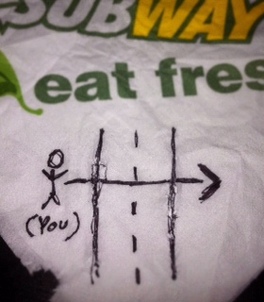 This will be a short blog post, yet I feel an important one. There is a problem invading our homeland, a social issue gaining so much momentum that it threatens to usurp all we know about Constitutionally-guaranteed laws and our standards of citizenship. It’s a debate so profound, so polarizing, that it’s managed to infect every corner of our American conversation. No inner city, no woody suburb, no hamlet is immune, and the danger to our children is un-arguable. I’m talking about people not knowing how to cross the street correctly, of course. I’d like to offer my assistance. First off, let’s cover how NOT to cross the street: 1. DO NOT walk diagonally, nor zig zag in any fashion. I’ve been nice enough to illustrate the recommended route in the attached diagram. Please note: Subway Sandwiches does not endorse these messages in any way. It’s just what I had for lunch so the napkin was close by. 2. Do not lollygag, stroll, pimp, shuffle, tiptoe, waddle, skip to your loo, Cadillac, peacock, Crip walk, or Irish river dance across the street. Just walk at a healthy pace. 3. If, for some reason, you cannot walk at a healthy pace (like you only have one leg or suffer from debilitating venereal warts) and you find yourself impeding motorists because the light turned green prematurely, common courtesy dictates that you jog the rest of the way across the street. A fake jog, more of a bounce, really, just for show and even slower than a regular walk, is perfectly acceptable, as long as it communicates a “little hustle” to the waiting motorists. 4. Do not purposely time your walk so that you will still be in the middle of the intersection when the light turns green. That’s not cool. And while we’re at it, pull up your pants, son. 5. If you are in a parking lot, say, outside of a grocery store, then PLEASE, I IMPLORE you, for the love of all that is holy, stick to the sides of the rows, not right down the middle. A recent study reports that 92% of traffic congestion originates with the 40-minute wait times to crawl forward 25 feet in front of Safeways and ShopRites. 6. If you’re bringing cargo on your voyage: little fat children, a drunk girlfriend, a pet, the new addition of dog shit on your left shoe, any members of your family over 60 years old, or a shopping cart with one bad wheel, please make sure it remains by your side at all times, clearing the intersection with you. And now a few pointers on the CORRECT way to cross the street: 1. Be on the other side of the street, opposite the side you want to end up on. (This seems self-explanatory yet it is worth noting because it’s SO important that you get this right.) 2. Walk to the nearest pedestrian cross walk or intersection. If they have one of those little buttons then push it, even though no one knows why you have to push it because the light is going to turn green or red as scheduled, anyway. 3. When the pedestrian signal comes up, start walking. 4. Walk from Point A to Point B in a straight line expeditiously, with little or no deviance. This is the shortest distance between these two points, trust me. 5. Congratulations, you’ve arrived safely on the other side of the street. Only now is it a good time to collect yourself and figure out where the fuck you intend to go, yell pleasantries to your friends, check work emails, or respond to important sexts. I hope this was helpful. I’m having 1,000,000 posters printed up with this message, slated for distribution as public service announcements and hung next to every emergency eyewash fountain in America. Until then, God speed, and keep it moving. Follow me on Twitter @NormSchriever and tune in next week, when we examine the linguistic conundrum; is it “AXE?” or is it “ASK?”  I was born in the United States, but as far as I can tell I did nothing to deserve that. Like many of you, I grew up with more than some and less than others, but for me, that privilege wasn’t earned. So what predetermined my existence into the wealthiest country in the world, where almost everyone has access to better themselves and live a comfortable life? The answer is: luck, dumb luck, a twisted cosmic roll of the dice. We’d like to tell ourselves that we have so much because we’re better, we’re right, we’re more civilized, morally superior, that we’ve achieved this destiny with our hard work and “go get ‘em” American gumption. Bullshit. That’s ridiculous. For those of you who have travelled outside of U.S. borders – and I mean really travelled, not been to the gross Disney-esque façade of a Cabo or all-inclusive resort in the Caribbean, you know what I mean. Daily life is a struggle for most people in the world, the rule – not the exception. Things that aren’t even on our radar enough to take for granted, like clean water and a roof over our heads and enough food to eat, are a daily scramble. I’ve seen whole villages picking through the dumps to survive, families lined up waiting out back of a restaurant for the trash to come out so they can dive in the dumpster and fight for their scraps of dinner. The images of children working the streets are burned into my conscience, barefoot 3 year olds dodging traffic to beg a few coins, huffing glue or gasoline to keep the hunger away. Or for the girls, worse. I don’t believe in fate – there’s no rational explanation why “God” put them there and me here. But because of our lofty station I do believe that we’ve been given the gift of social responsibility. I call it a gift and not a duty because it’s preferable to the alternative. Everyone rallies for their own self interests – everyone, it’s just human nature. Business owners and the wealthy want lower taxes, those who are on the lower end want a sturdier ladder to climb out of classism and a better social safety net. Dare I say that those in lily-white affluent suburbs aren’t too concerned with the 500 gun deaths in the streets of Chicago every year until a tragedy befalls them? I’m not laying blame, let me be clear about that, it’s just how it works – everyone rallies for their own self-interests, including me. It's no grand coincidence that teachers lobby for education, baseball players care about the strength of their union above the sanctity of the game, and DMV employees...well, bad example - forget about them. When you zoom out far enough what you're left with is a bunch of competing self interests, all yelling over each other to be heard. But for those of us in the U.S.A., that dice-roll of chance blessed us with the opportunity to be better than that, not because of what we have our hand out to take but because of what we can give. We can care for others who may fall outside our sphere of personal self-interests without threatening our survival. THAT is American Exceptionalism. And yet we fail, more often than not, because we’re so concerned with keeping score, blinded by comfort and consumerism and a hyper-angry mentality of fear that’s come to infect our culture. Trust me when I tell you that if you really want to look at the world and all of the possibilities for your existence, it will be quite an eye opener. I’m not talking about being a liberal or a conservative - throw your politics in the trash as far as I’m concerned, for either one in excess imbalances that notion of greater good. Loyalty to a political party often is nothing more than allegiance to whichever side represents the biggest bundle of your own self interests. No, I’m just talking about being a good human being. Please do me a favor - the next time you’re about to vote, to speak, or to act on an issue, or even before you judge your fellow man without walking a mile in his shoes, ask yourself the brutally honest question: “Am I only thinking about what’s best for me?” Or what’s best for us?” And if the answer is the former, then how can I rise above it? Now if everyone did that, what kind of world would we live in? Feel free to share these blogs and follow me on Twitter @NormSchriever. |
Norm SchrieverNorm Schriever is a best-selling author, expat, cultural mad scientist, and enemy of the comfort zone. He travels the globe, telling the stories of the people he finds, and hopes to make the world a little bit better place with his words. Categories
All
Archives
October 2022
|
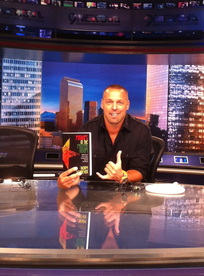
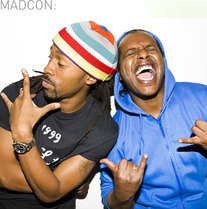
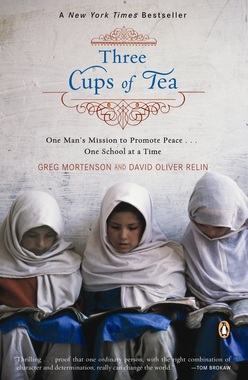
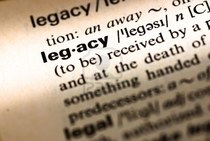
 RSS Feed
RSS Feed